Nutmeg may support digestion, brain function, and overall wellness when consumed in small, safe amounts.
This aromatic spice—derived from the seed of Myristica fragrans—is valued not only for its flavor but also for its potential health-promoting compounds. Rich in antioxidants and essential oils, nutmeg has long been used in traditional medicine for digestive comfort, cognitive support, and immune balance.
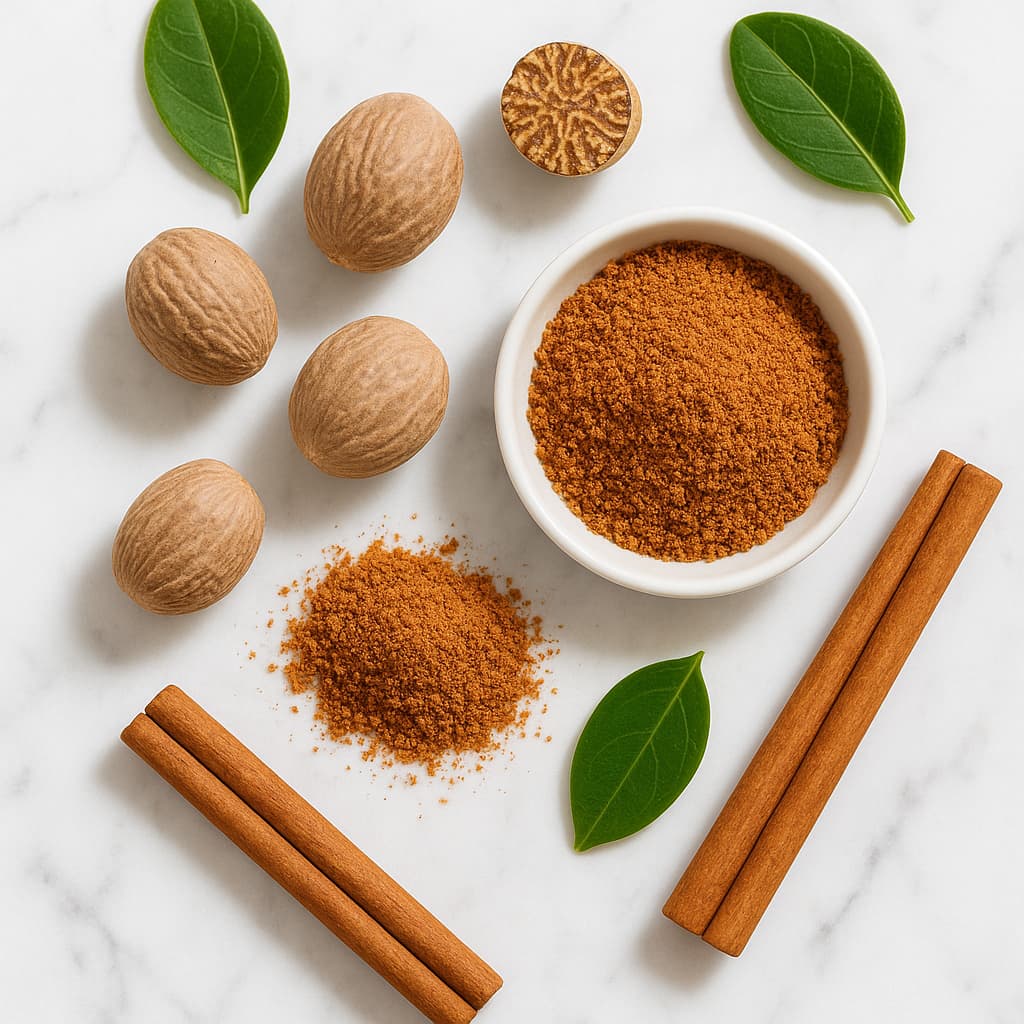
Understanding nutmeg’s science-backed benefits helps you use it safely and effectively in your diet. Below, we explore the top evidence-based health benefits of nutmeg, supported by recent studies and nutritional research.
What Is Nutmeg?
Nutmeg (Myristica fragrans) is a warm, aromatic spice derived from the seed of the evergreen nutmeg tree, native to the Banda Islands of Indonesia—historically known as the “Spice Islands.” The seed is dried and ground to produce nutmeg powder, while its surrounding red lacy covering is processed into mace, another valuable spice.
Harvesting involves drying the ripe seeds under sunlight until the kernels shrink and rattle inside their shells. Once dried, the hard shell is cracked to release the nutmeg seed, which can then be ground into powder or used whole for grating in culinary dishes.
In modern kitchens, nutmeg is used globally to add depth and warmth to sweet and savory recipes such as baked goods, curries, soups, and beverages like eggnog or chai. Traditionally, it was also valued in Ayurvedic and Middle Eastern practices for its digestive and soothing qualities.
Today, scientific interest in nutmeg focuses on its natural antioxidants, essential oils, and trace minerals, which contribute to its culinary and nutritional importance.
References:
Nutritional Profile of Nutmeg
Nutmeg provides a rich array of nutrients and phytonutrients in very small serving sizes. It is particularly high in fiber, manganese, magnesium, calcium, and antioxidant compounds such as phenolics and essential oils.
Below is the nutritional composition of ground nutmeg per 100 grams, based on the latest USDA FoodData Central data (FDC ID: 170932):
| Nutrient | Amount per 100 g | % Daily Value (approx.) |
|---|---|---|
| Calories | 525 kcal | — |
| Protein | 5.8 g | 12 % |
| Total Fat | 36 g | 55 % |
| Carbohydrates | 49 g | 16 % |
| Dietary Fiber | 20 g | 71 % |
| Calcium | 184 mg | 18 % |
| Iron | 3 mg | 17 % |
| Magnesium | 183 mg | 46 % |
| Potassium | 350 mg | 10 % |
| Vitamin B6 | 0.16 mg | 12 % |
| Antioxidant Compounds | Myristicin, eugenol, sabinene, lignans | — |
(Source: USDA FoodData Central)
10 Proven Health Benefits of Nutmeg (Backed by Science)
Modern research continues to uncover nutmeg’s wide-ranging nutritional and physiological properties. Below are ten evidence-based benefits of this aromatic spice, highlighting its potential roles in antioxidant defense, digestion, metabolism, and overall wellness.
1. Rich Source of Antioxidants
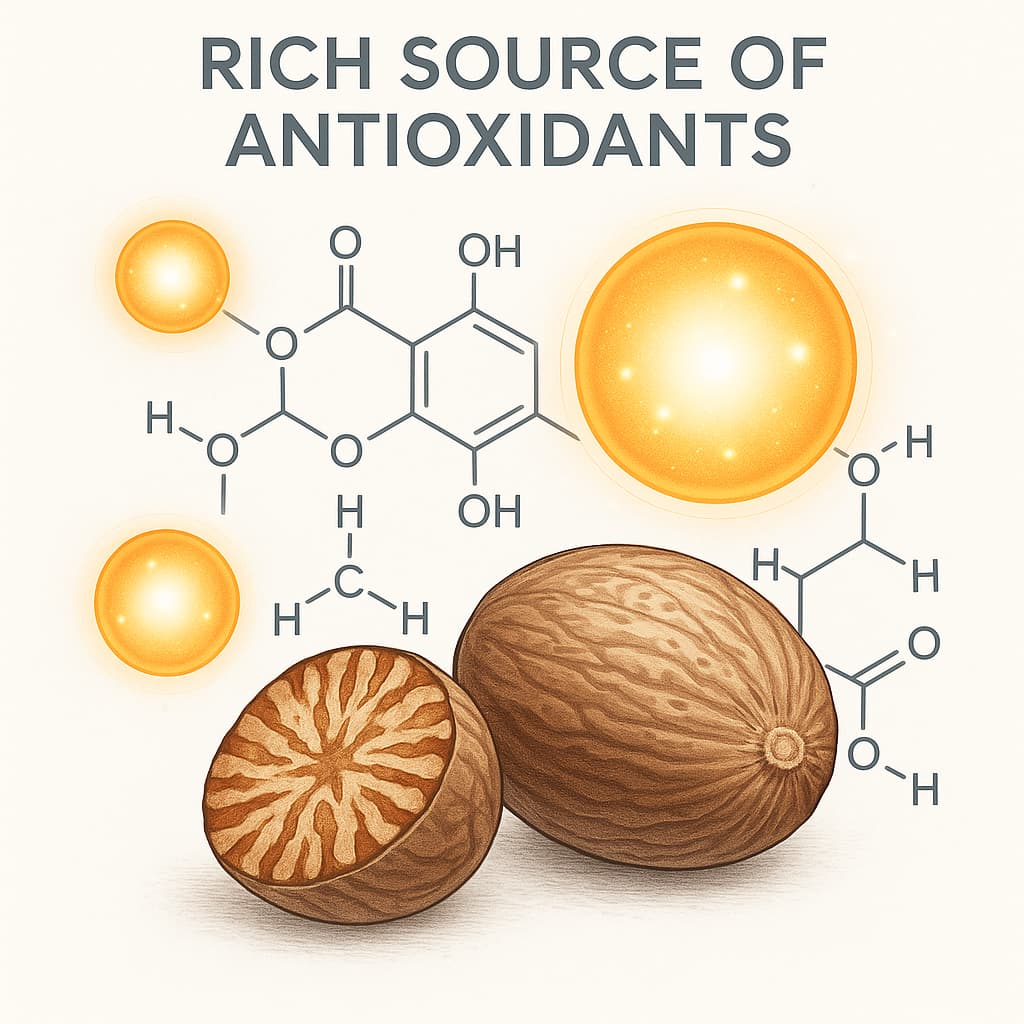
Nutmeg is a potent source of phenolic compounds, lignans, and essential oils—including myristicin, sabinene, and eugenol—that may help protect the body from oxidative stress and cellular damage. These natural antioxidants play an important role in defending cells from free radicals, which are unstable molecules linked to inflammation, premature aging, and chronic disease development.
A 2024 peer-reviewed review published in the Saudi Journal of Biological Sciences confirmed that nutmeg seed extract enhances antioxidant enzyme activity—including catalase, superoxide dismutase, and glutathione peroxidase—while reducing oxidative biomarkers in laboratory studies. Researchers concluded that nutmeg’s bioactive compounds help maintain redox balance and cellular integrity, making it a valuable dietary spice for long-term wellness (ScienceDirect, 2024).
Similarly, a 2022 study published in Frontiers in Nutrition found that dietary inclusion of nutmeg significantly improved antioxidant capacity and immune defense in biological models, suggesting its potential role in supporting metabolic health and overall vitality (Frontiers in Nutrition, 2022).
Incorporating small, culinary amounts of nutmeg—such as a pinch in oatmeal, coffee, or herbal tea—can contribute to natural antioxidant support as part of a balanced, nutrient-rich diet, especially when paired with other antioxidant-rich foods like berries, green tea, and leafy vegetables.
2. Supports Digestive Function

Nutmeg has been traditionally valued for its digestive-supportive properties, particularly in soothing bloating, nausea, and mild indigestion. Its bioactive components can stimulate the secretion of digestive enzymes, promoting smoother digestion and nutrient absorption.
A 2021 review in the Journal of Ethnopharmacology confirmed that nutmeg exhibits carminative and gastroprotective effects, which may help reduce gas and support a healthy gut environment (Journal of Ethnopharmacology).
Sprinkling a pinch of nutmeg in herbal teas or soups may gently support digestive comfort without excessive spice.
3. May Support Brain and Cognitive Health

Nutmeg contains naturally occurring compounds such as myristicin and macelignan, which may influence key neurotransmitters like serotonin and dopamine—critical for mood balance, memory, and cognitive performance. These bioactive molecules also exhibit antioxidant and anti-inflammatory activity that may help protect brain cells from oxidative stress and age-related decline.
According to a 2024 study published in Saudi Journal of Biological Sciences, nutmeg seed extract demonstrated notable neuroprotective properties, improving memory performance and reducing oxidative markers in experimental brain models. Researchers attributed these effects to nutmeg’s ability to enhance antioxidant enzyme activity and suppress neuroinflammatory pathways (ScienceDirect, 2024).
While large-scale human trials are still limited, these findings suggest that incorporating small, culinary amounts of nutmeg into a balanced diet may help support cognitive health, mental focus, and long-term brain resilience. For best results, this should complement an overall healthy lifestyle that includes regular exercise, sufficient sleep, and a nutrient-rich diet.
4. Anti-Inflammatory and Pain-Relieving Properties
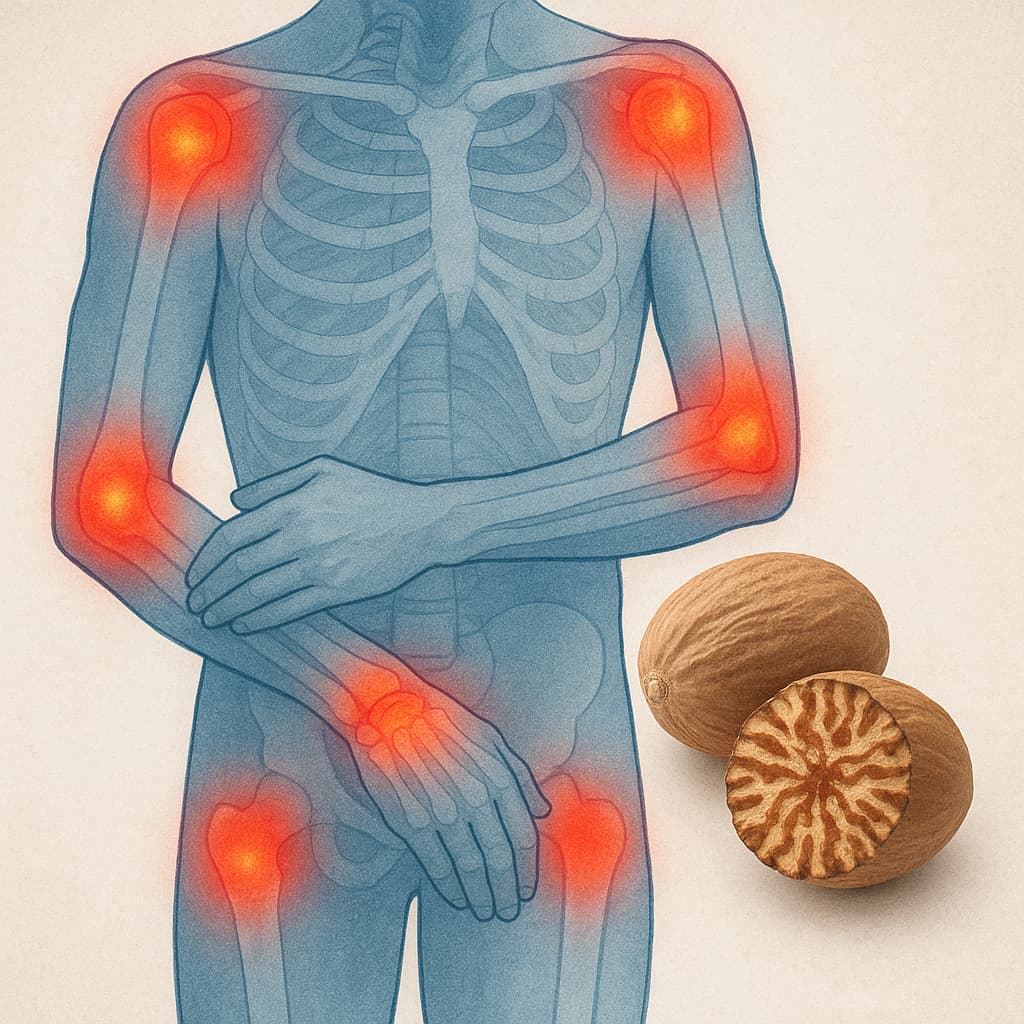
Nutmeg’s essential oils—particularly eugenol and safrole—have demonstrated anti-inflammatory and mild analgesic effects in laboratory studies.
A 2020 investigation in Food & Function found that nutmeg extract reduced inflammatory biomarkers and oxidative stress in test subjects, suggesting potential benefits for joint comfort and tissue health (Food & Function).
In culinary use or topical preparations, nutmeg may help support post-workout recovery and general musculoskeletal wellness.
5. Supports Heart Health and Cholesterol Balance

Polyphenols in nutmeg may help support healthy lipid metabolism and blood circulation.
Research summarized in the Nutrients journal (2021) indicates that nutmeg extract may reduce LDL cholesterol and triglycerides while improving vascular health through antioxidant protection (Nutrients Journal).
Including nutmeg as part of a balanced, heart-friendly diet—alongside fruits, whole grains, and olive oil—may help support overall cardiovascular wellness (Harvard T.H. Chan School of Public Health).
6. Potential Support for Blood Sugar Regulation

Preclinical studies suggest nutmeg may play a role in glucose metabolism and insulin sensitivity.
A 2023 study in Phytotherapy Research found that nutmeg extract significantly reduced fasting glucose and improved insulin activity in diabetic animal models (Phytotherapy Research).
Although more human data are needed, these results indicate nutmeg may help support stable blood sugar levels when paired with a nutrient-dense diet and regular exercise.
7. Antimicrobial and Oral Health Benefits
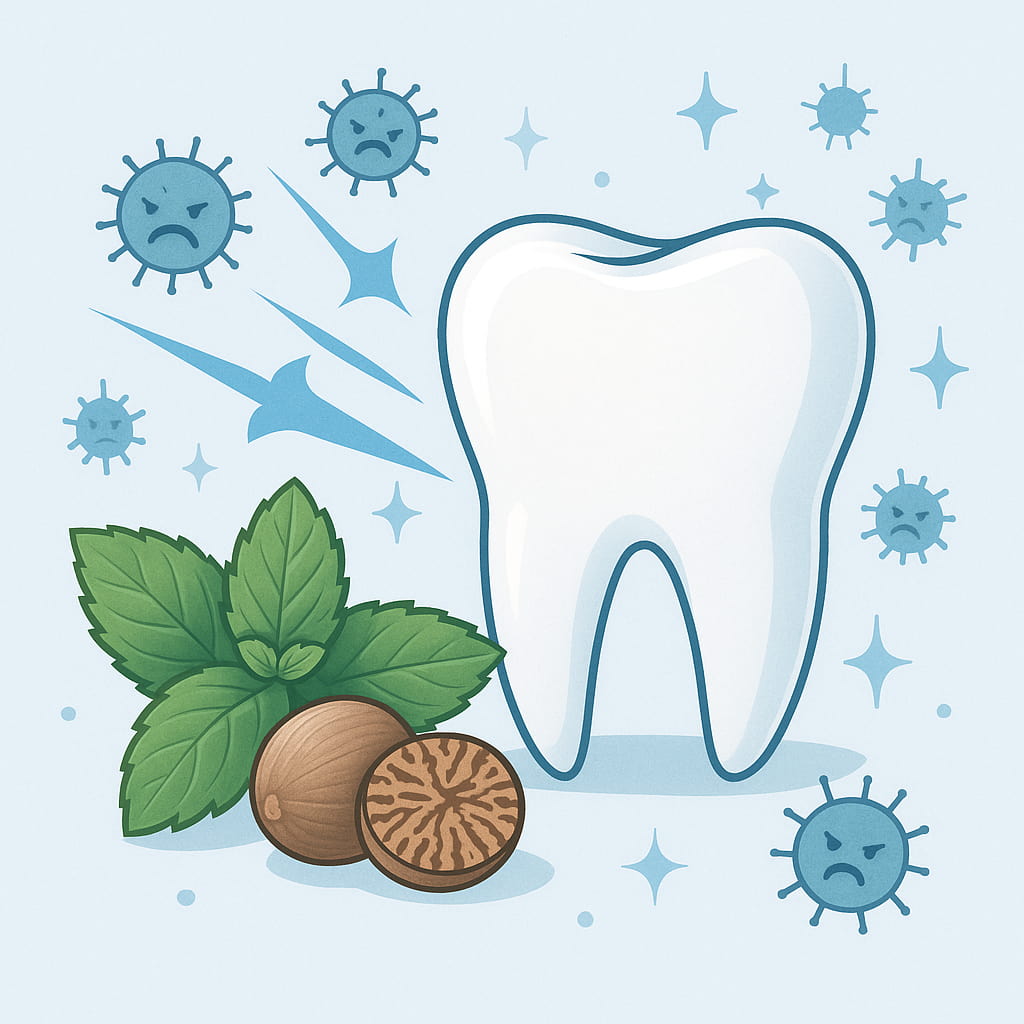
Nutmeg’s bioactive compounds—especially myristicin and eugenol—show antibacterial activity against oral pathogens linked to cavities and halitosis.
A 2021 study in the Journal of Natural Products demonstrated that nutmeg extract inhibited the growth of Streptococcus mutans, one of the main bacteria responsible for dental plaque formation (Journal of Natural Products).
Its natural antimicrobial effects support nutmeg’s traditional role in oral hygiene and fresh-breath formulations (Cleveland Clinic).
8. May Support Liver Health

Nutmeg’s hepatoprotective activity is attributed to compounds that may defend liver cells against toxin-induced damage and oxidative stress.
A 2022 study published in Biomedicine & Pharmacotherapy found that nutmeg extract restored antioxidant enzyme levels and reduced inflammatory responses in the liver of animal models (Biomedicine & Pharmacotherapy).
Although human trials are lacking, these findings suggest nutmeg may support liver function and detoxification processes when consumed responsibly.
9. Supports Sleep and Relaxation

Nutmeg has been traditionally used as a natural calming agent. Its compounds may enhance the activity of gamma-aminobutyric acid (GABA), a neurotransmitter that promotes relaxation.
A 2020 pilot study reported that consuming small amounts of nutmeg powder in warm milk before bedtime improved sleep onset and overall rest quality among adults (PubMed, Sleep Foundation).
Adding a pinch of nutmeg to warm milk or herbal tea may gently support evening relaxation and restorative sleep.
10. Supports Skin Health and Detoxification
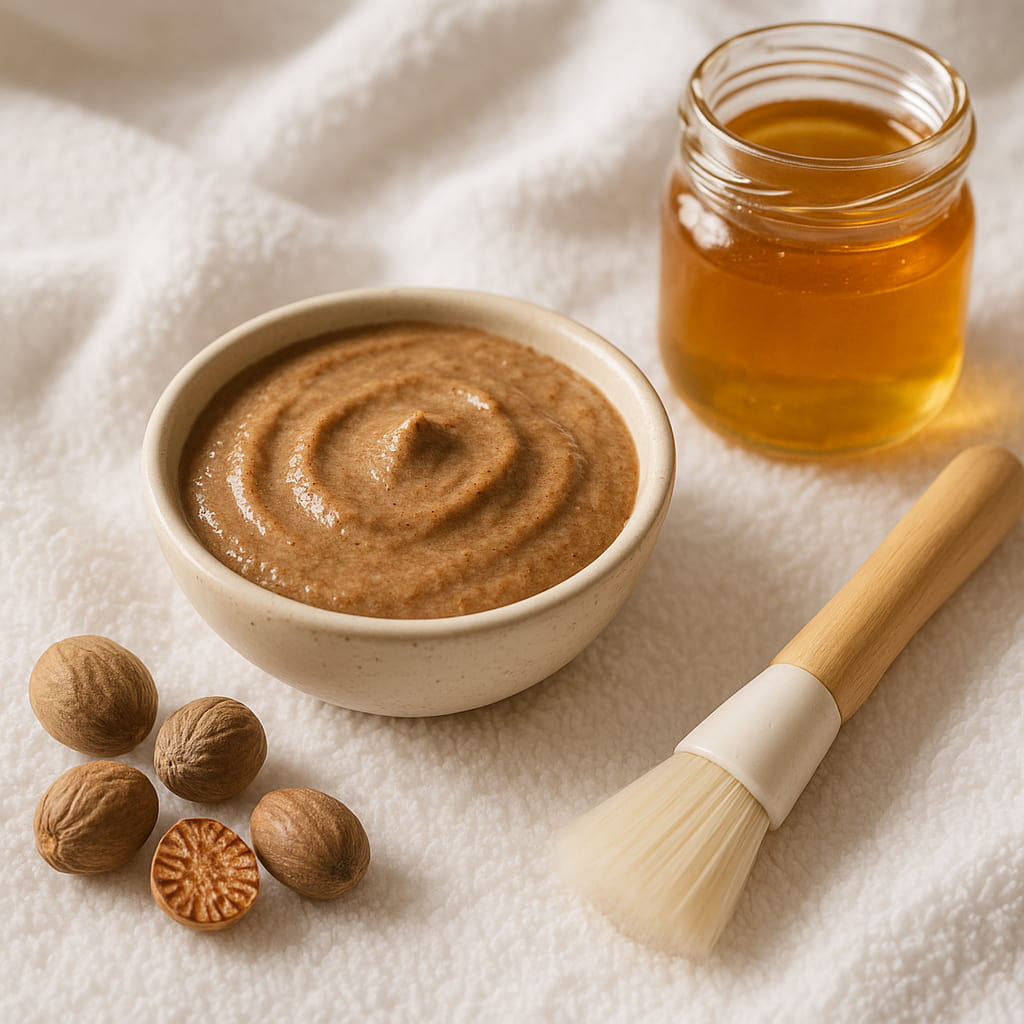
Nutmeg’s combination of antioxidants and antibacterial agents has made it a common ingredient in natural skincare formulations.
Studies suggest that nutmeg extract may support clearer skin by minimizing oxidative damage and microbial growth on the skin’s surface.
Its phenolic content also helps neutralize environmental toxins that can dull skin tone or accelerate aging (PubMed Central, Health.com).
Using nutmeg in DIY masks or infused oils may complement topical detox routines, though patch testing is advised for sensitive skin.
How to Use Nutmeg for Best Results

Nutmeg is best enjoyed in very small, culinary amounts—typically ¼ teaspoon (about 0.5–1 gram) per serving. This amount delivers rich flavor and aroma without exceeding safe limits for its natural compound, myristicin, which can be toxic in high doses.
You can incorporate nutmeg into your diet in simple, enjoyable ways:
- Warm beverages: Add a pinch to coffee, chai, or hot cocoa for a comforting, spiced aroma.
- Breakfast dishes: Sprinkle over oatmeal, pancakes, or smoothies.
- Savory recipes: Use in soups, curries, or roasted vegetables for depth and balance.
- Baking: Include in cookies, pies, or custards for traditional warmth.
According to the Cleveland Clinic, nutmeg is safe when used in small culinary quantities but can cause adverse effects if consumed in excess. Similarly, WebMD advises limiting intake to small amounts since high doses may trigger unwanted reactions.
To enjoy its benefits safely, use nutmeg sparingly—just enough to enhance flavor and aroma, not as a supplement.
Possible Side Effects and Precautions
Nutmeg is safe when consumed in small culinary amounts, but excessive intake—typically more than 1 to 2 teaspoons per day—can cause serious side effects. This is primarily due to naturally occurring compounds like myristicin and safrole, which may become toxic at high doses.
Potential side effects of overconsumption include:
- Nausea, dizziness, and vomiting
- Rapid heartbeat or palpitations
- Hallucinations or confusion
- Dry mouth, headache, or agitation
Pregnant and breastfeeding individuals should avoid large quantities of nutmeg, as its volatile oils may trigger uterine contractions or pose risks to fetal development. People taking medications that affect the nervous system or liver should also consult a healthcare provider before regular use.
The U.S. Food and Drug Administration (FDA) classifies nutmeg as “Generally Recognized as Safe (GRAS)” when used in food amounts but cautions that excessive or unsafe use can lead to toxicity. The FDA also advises following standard spice-handling and food-safety guidelines to reduce contamination risks and preserve product quality (FDA – Improving the Safety of Spices).
In summary, nutmeg is a flavorful, nutrient-rich spice that can safely enhance meals when used sparingly. Always measure carefully and store it properly—use it as a seasoning, not as a supplement—to avoid potential health risks.
Storage and Food Safety Tips
Proper storage is essential to preserve nutmeg’s aroma, potency, and antioxidant-rich essential oils while preventing contamination or spoilage. Keeping spices fresh not only enhances flavor but also supports food safety and quality—key factors emphasized in U.S. food safety standards.
Recommended storage practices (FDA & USDA guidance):
- Store in airtight containers: Keep whole or ground nutmeg tightly sealed to prevent moisture and air exposure, which can degrade flavor and beneficial oils.
- Maintain a cool, dark environment: Store below 25 °C (77 °F) and away from sunlight or heat sources such as stoves. High temperatures and humidity accelerate loss of volatile oils and aroma.
- Avoid contamination: Use clean, dry utensils and never shake containers directly over steaming food—steam introduces moisture that can promote bacterial growth.
- Shelf life: According to the U.S. Department of Agriculture (USDA), whole nutmeg typically retains optimal quality for 2–4 years, while ground nutmeg maintains freshness for about 6–12 months when stored properly.
- Check for freshness: Dull color, clumping, or loss of aroma indicate that it’s time to replace your spice supply.
The U.S. Food and Drug Administration (FDA) highlights that spices can lose quality or become contaminated if not handled properly, urging consumers to store them in cool, dry, and airtight conditions to maintain safety and integrity (FDA – Improving the Safety of Spices, 2024).
In summary, nutmeg should always be stored in a sealed, moisture-free container in a cool pantry, away from heat and light. Following FDA and USDA best practices ensures both culinary quality and food safety—allowing you to enjoy nutmeg’s rich flavor and nutrients with confidence.
Frequently Asked Questions (FAQ)
Q1. How much nutmeg is safe to consume daily?
Up to ¼ teaspoon (about 1 gram) per day is considered safe for healthy adults.
Q2. Can nutmeg be used during pregnancy?
It’s best avoided in large amounts; consult your healthcare provider before use.
Q3. Does nutmeg help with sleep?
Yes, it may support relaxation when used in small amounts before bedtime.
Q4. Can nutmeg interact with medications?
High doses may interact with sedatives or antidepressants. Always consult a physician before use.
Q5. What are the signs of nutmeg toxicity?
Nausea, dizziness, hallucinations, or palpitations after high intake—seek medical help immediately.
Q6. Is nutmeg safe for children?
Yes, in small culinary amounts (e.g., in desserts), but not for medicinal purposes.
Q7. How can I tell if nutmeg has gone bad?
Loss of aroma or a stale, woody smell indicates it’s time to replace it.
Conclusion
Nutmeg is a nutrient-rich, aromatic spice that may support digestion, brain health, and antioxidant protection when used in moderation. Its warm flavor complements both sweet and savory dishes, making it a versatile addition to a balanced diet.
However, due to its potent natural oils, nutmeg should always be used sparingly—just enough to enhance flavor without risking toxicity.
For long-term wellness, pair nutmeg with other antioxidant-rich foods such as berries, leafy greens, and whole grains to build a well-rounded, health-supportive diet.
This content is for informational purposes only and not medical advice.
References:
- Al-Rawi, S. S. et al. (2024). Therapeutic and pharmacological prospects of nutmeg seed (Myristica fragrans). Saudi Journal of Biological Sciences.
- Vakili, F. et al. (2022). Dietary nutmeg improved antioxidant defense and immune responses in zebrafish. Frontiers in Nutrition.
- Parle, M. & Dhingra, D. (2004). Improvement of mouse memory by Myristica fragrans seeds. Phytotherapy Research.
- Yang, X-N. et al. (2018). PPAR-α mediates the hepatoprotective effects of nutmeg in thioacetamide-induced liver injury. Journal of Proteome Research.
- Pashapoor, A. et al. (2020). Nutmeg extract improves glucose metabolism and antioxidant capacity in diabetic rats. Journal of Basic and Clinical Physiology and Pharmacology.
- U.S. Department of Agriculture (USDA). FoodData Central: Spices, nutmeg, ground — nutrient profile.
